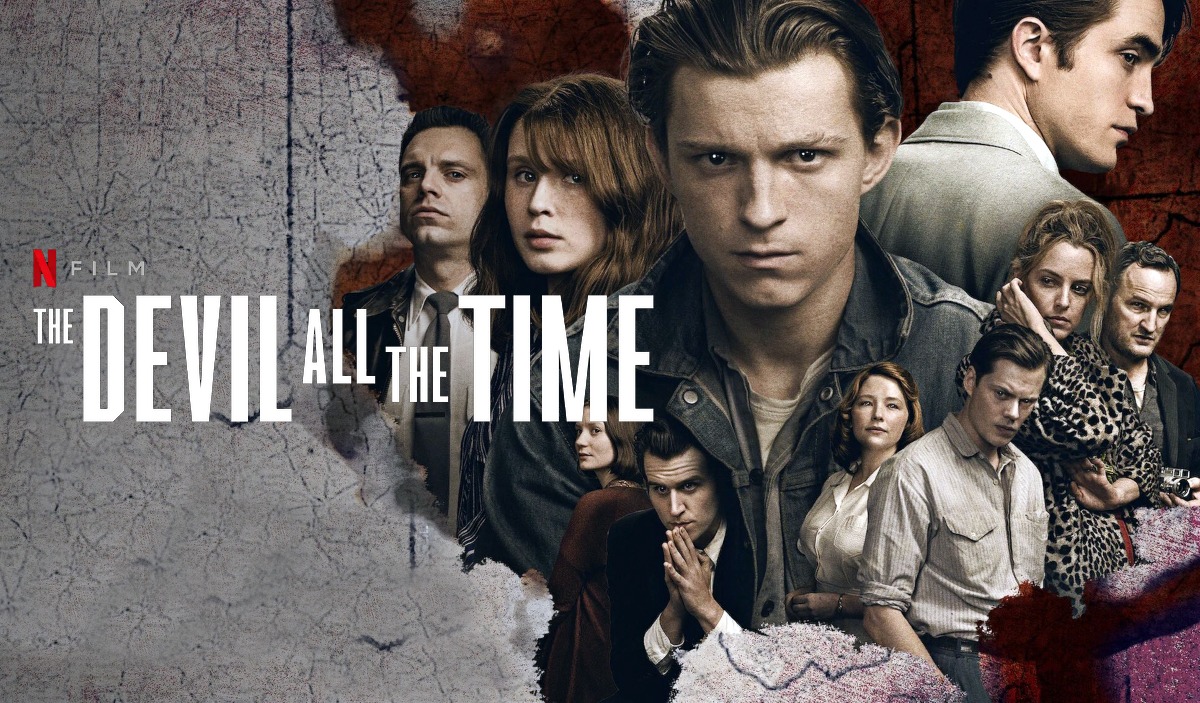The Devil All the Time (2020)

“The Devil All the Time,” released in 2020, is a haunting and atmospheric film that delves into the darkest aspects of human nature. Directed by Antonio Campos and based on the novel by Donald Ray Pollock, the film features an ensemble cast including Tom Holland, Robert Pattinson, Bill Skarsgård, Riley Keough, and Mia Wasikowska. With its gritty portrayal of violence, morality, and desperation, “The Devil All the Time” presents a complex and unsettling narrative set in the rural American South.
The film is set in the 1950s and 1960s in a small, impoverished town in Ohio, where a web of interconnected lives unfolds amidst a backdrop of violence and suffering. The story centers around Arvin Russell (Tom Holland), a young man who faces a series of harrowing events and moral dilemmas as he comes of age. The narrative explores the impact of the region’s pervasive darkness on Arvin and the people around him, creating a tapestry of intersecting stories that reveal the depths of human depravity and the quest for redemption.
Antonio Campos, known for his work on “Christine” and “Simon Killer,” directs “The Devil All the Time” with a keen eye for atmospheric detail and psychological tension. Campos’s direction creates a palpable sense of dread and unease, effectively capturing the film’s bleak and oppressive atmosphere. His approach to storytelling is immersive, drawing viewers into the grim realities of the characters’ lives while exploring themes of violence, faith, and the search for meaning in a morally ambiguous world.
Tom Holland delivers a standout performance as Arvin Russell, showcasing his range and depth as an actor. Holland portrays Arvin with a blend of vulnerability and quiet determination, capturing the character’s internal struggle and resilience in the face of overwhelming adversity. His performance is central to the film’s emotional impact, providing a relatable anchor amidst the chaos and darkness that surrounds him.

Robert Pattinson, known for his transformative roles in films such as “Good Time” and “Cosmopolis,” plays the sinister and unhinged preacher Preston Teagardin. Pattinson’s portrayal of Teagardin is both unsettling and captivating, embodying the character’s predatory nature and warped sense of religious zeal. His performance adds a layer of menace and complexity to the film, highlighting the corrupting influence of power and fanaticism.
Bill Skarsgård, who gained acclaim for his role as Pennywise in “It,” plays Willard Russell, Arvin’s father. Skarsgård’s portrayal of Willard is marked by a sense of internal conflict and psychological trauma, reflecting the character’s struggle with his own demons and the impact of his actions on his family. Skarsgård’s performance adds depth to the film’s exploration of generational violence and the cyclical nature of suffering.

Riley Keough and Mia Wasikowska also deliver strong performances in supporting roles. Keough, as Sandy, plays a pivotal role in the film’s narrative, embodying a character whose choices have far-reaching consequences. Wasikowska, as Helen, provides a poignant portrayal of a woman trapped in a desperate situation, contributing to the film’s exploration of despair and the search for escape.
The screenplay, adapted by Antonio Campos and Paulo Campos from Donald Ray Pollock’s novel, weaves together multiple storylines and perspectives, creating a complex and interconnected narrative. The screenplay is notable for its intricate structure and character development, capturing the novel’s dark and evocative tone. The dialogue is sharp and impactful, reflecting the characters’ inner turmoil and the harsh realities of their environment.
The film’s cinematography, handled by Lol Crawley, plays a crucial role in establishing its mood and atmosphere. Crawley’s use of muted colors, shadowy compositions, and evocative imagery enhances the film’s sense of foreboding and desolation. The visual style complements the narrative, creating a haunting and immersive experience that draws viewers into the film’s bleak world.
The music score, composed by Daniel Hart, adds to the film’s emotional depth and intensity. Hart’s score is characterized by its somber and haunting melodies, which underscore the film’s themes of darkness and despair. The music effectively enhances the film’s atmosphere and contributes to its overall impact.

Despite its strengths, “The Devil All the Time” has faced some criticism, particularly regarding its portrayal of violence and its complex narrative structure. Some viewers may find the film’s depiction of brutality and moral ambiguity to be overwhelming or challenging. Additionally, the film’s interwoven storylines and large ensemble cast may be perceived as somewhat disjointed or difficult to follow. However, these elements also contribute to the film’s ambitious and thought-provoking nature, making it a distinctive and impactful piece of cinema.

In conclusion, “The Devil All the Time” is a powerful and evocative film that explores the darkest aspects of human nature through its gripping narrative and complex characters. Directed by Antonio Campos and featuring strong performances from Tom Holland, Robert Pattinson, Bill Skarsgård, and the rest of the cast, the film offers a haunting and immersive experience. Its exploration of violence, faith, and the search for redemption makes it a compelling and thought-provoking entry in the genre. With its atmospheric visuals, evocative score, and intricate storytelling, “The Devil All the Time” stands as a testament to the power of cinema to delve into the depths of the human experience.











